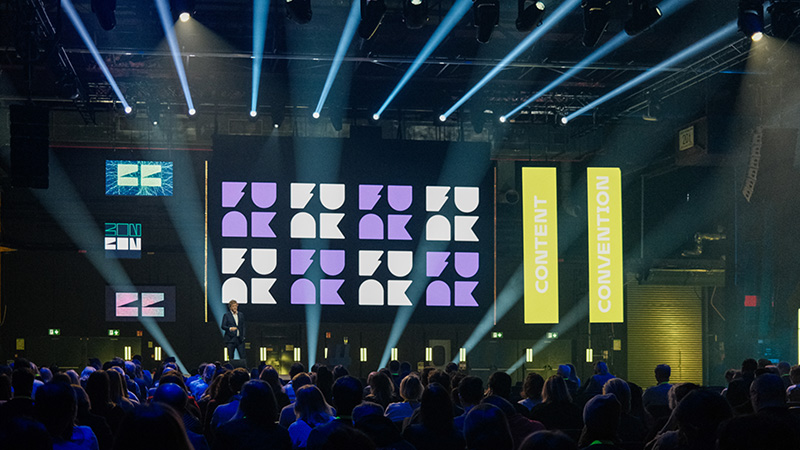Media and politics in focus: Deep Insights from the Content Convention in Mainz – this year with a discourse on AI
For several years we have wanted to attend the Content Convention in Mainz, and this year we finally succeeded. A whole day of discussion about media and politics and the future of media production, from public broadcasters to private media companies to platforms and influencers – the whole range of moving image content in an industrial hall with an attached exhibition. All hosted by none other than the State Chancellery of Rhineland-Palatinate – yes, you heard that right. Proving that government events can be colorful and feature A‑list speakers, the conference is part of their media strategy.
We learned from Anna Graf that NFT’s are not dead, that RTL is using them, and that the career of Snapchat’s Suzy Cox began in 1440 in Mainz. We didn’t run our advanced diversity analysis on the program, but the speakers were well diverse and the female keynotes often outperformed the male content. This year’s topic was all over AI – just as any conference in the past 12 months.
But some of the projects presented made it unique and very interesting – especially as a company offering an AI toolbox. One example came from funk – the non-linear content channels of ARD & ZDF. Head of Content Philipp Schild presented how funk is trying to gain more insight into the diversity of its topics and narratives by using a portfolio of AI tools that her team has brought together to have a trusted source of media intelligence to analyze the 22,000 videos that her network currently hosts, produced in around 200 formats.
They transcribed 22,000 videos and the resulting text gave them the ability to analyze them, focusing on themes and narratives, and feed them into a knowledge graph. The knowledge graph links all these assets and clusters them into different themes, giving them a broader view not only of the 200 channels but also of all their individual assets.
From this, they build their own LLM to summarize and describe these clusters into subtopics. With this metadata base, they are not only able to provide detailed information about the topics they cover, they are also currently building a framework that will allow them to further analyze the diversity of narratives per topic in order to comply with public service broadcasting guidelines. A superb example how an AI toolbox can bring valuable insight into a media company.

Christian Hirth, CEO of DeepVA, spoke to Meinolf Ellers about the extent to which AI is entering our lives, where German AI companies stand in contrast to the major players in the USA and the extent to which technology and applications should be regulated.
DeepVA works transparently, and their customers have the opportunity to be the master of their data and algorithms, to use and expand functions individually – as required and with a high level of data security. This is where they have gained a major advantage and built up trust.
Where Germany is lagging far behind is in the area of investment and funding. The AI start-up Aleph Alpha set a good example with an investment of around 500 million dollars. Germany should continue to build on this, says Lara Sophie Bothur.
The aim would also be to regulate not the technologies, but the applications with AI and to share both data and knowledge more, to bring together open source solutions – for more transparency and collaboration. Everyone agreed on this topic.
ZDF director Norbert Himmler reported on presenters from his company who were deepfaked and had things put in their mouths that they never said. It is not only since these incidents that the question is no longer how to recognize deep fakes, but how to label authenticity.
Head of the ARD Kai Gniffke stressed that the technology of AI is already there and we need to build up technical literacy and also develop a spirit of trying out first. Especially in the journalistic area the risks are always the topics which are addressed first, but without testing you won’t be able to keep up the pace and innovate. TikTok explained that they would also welcome common standards and they already implemented the need to label all GenAI content and they are working on a detection for this, to label generative services themselves.
Minister President Malu Dreyer emphasized that you have to see the opportunities in AI, but it is already used very intensively in the media world and the truth is that we are lagging behind in the legislative process. She was impressed by the fact that 21 million young Germans are on TikTok and that all the years of youth protection are practically obsolete and that society is facing a big task, seeing how the current crisis affects especially this social network.
TikTok countered this clear statement with figures showing that around one million videos were deleted last month due to anti-Semitism, that they have around 40,000 experts worldwide to report content, and that any user can report a post themselves with two clicks. However, he also emphasized the need for media education and that they are in the process of launching an awareness campaign on their platform with Correctiv.
YouTube’s Sabine Frank emphasized that AI can actually be the key to the problem.
96% of deleted content on YouTube is detected by an AI. In addition, she feels it is important to reiterate that anything can be uploaded to a platform that is as open and democratic as possible. AI is the first line of defense, and it gets better all the time.

Embracing Opportunities: SWR’s Journey into AI-Driven Journalism
Thomas Dauser took us into the Future Report 2030 of the Südwestrundfunk, a vision where AI was one of the key elements. Regarding the impact of AI to journalism the SWR defined some strict rules for AI applications:
- Responsible handling of data
- Increased journalistic diligence by the editorial offices
- Control of and responsibility for content remains with humans
- Clear labeling of AI-generated content
Human-in-the-loop and clear labeling will be essential for journalistic adaptation of AI services. And all applications must create clear added value, for many challenges AI is only one option for a solution. This goes along with the goal that the SWR wants to remain as independent as possible from bigtech, not only they want to be able to understand how the data gets processed and where, they also will be very cautious by implementing ecosystems in which they might end up being limited to them. The SWR identified 120 use cases all over their company which could be solved using AI, in a first trial they limited to three of them:
- a safe language model, trained by their own data
- a generative image service for thumbnails, placeholders or
- automated translation of news program into simple language
In addition, they are already using a variety of AI solutions in their daily lives, from SEO optimization of text, to keywording of videos, to similarity search of music. We’ve seen immediate and direct success here, but it’s not just about the application, it’s also about educating and empowering the audience to understand AI, because without AI, it won’t be possible in the future.
Kai Gniffke mentioned in his panel speech that classic journalism today is more about focusing the ever-growing streams of content for the audience, because no one can watch thousands of minutes per hour uploaded to the platforms. By doing this transparently and with defined values, the media provides a verified and curated stream of content, and Norbert Himmler even emphasized this democratic offering: Next year, a social discussion room will be launched as a prototype, where the german public broadcaster will offer a discussion platform guarded by an AI that recognizes hate speech and steers the discussion in such a way that it remains constructive. An AI that strengthens core democratic values.
This year’s #ConCon23 not only showed once again that #Mainz is a German media capital close to Berlin and Cologne, but also the value of the event program it has put together with top journalistic events like Medientage München and Republica. Be sure to reserve the 07.11.2024 for #ConCon24.
Check out the recap of ConCon 2023 here:






